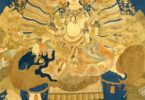《百喻经》
[The] Sūtra [Of A] Hundred Parables
(一一)婆罗门杀子喻
(11) Parable [Of The] Brahmin [Who] Killed [His] Son
昔有婆罗门自谓多知,于诸星术种种技艺无不明达,恃己如此,欲显其德,遂至他国,抱儿而哭。
[In the] past, [a] Brahmin personally called [himself to have] much knowledge, [to be] with all [of] astrology’s all kinds [of] skills, without [that] not understood thoroughly. Holding himself like this, [and] desiring [to] reveal his virtues, thereupon arriving [at] another country, [he] held close [his] son and cried.
有人问婆罗门言:「汝何故哭?」
[There] was [a] person [who] asked [the] Brahmin, saying, ‘You, [for] what thus, [are] crying?’
婆罗门言:「今此小儿七日当死,愍其夭伤以是哭耳。」
[The] Brahmin said, ‘[As my] this present small son [in] seven days will die, [I am with] grief [for his] premature death distressed, with this crying only.’
时人语言:「人命难知,计算喜错,设七日头或能不死,何为豫哭?」
[The] people [at that] time spoke, saying, ‘[Of] human lifespans, [as they are] difficult [to] know, [and with] calculations easily wrong, if [in] seven days’ time, [he is] perhaps able [to] not die, why cry beforehand?’
婆罗门言:「日月可暗星宿可落,我之所记终无违失。」
[The] Brahmin said, ‘[The] sun [and] moon can [go] dark [and] constellations can fall, [but] of those [that] I predict, [they are] in the end without mistakes.’
为名利故,至七日头自杀其子以证己说。
For fame [and] profit thus, arriving [at the] seventh day’s date, [he] personally killed his son, with [this] proving [what] he said.
时诸世人却后七日闻其儿死,咸皆叹言:「真是智者,所言不错。」心生信服悉来致敬。
Many [of the] world’s people [at that] time, however, after seven days, hearing [of] his son’s death, all praised [him], saying, ‘[He] truly is [a] wise one, [with] that said not wrong.’ [With] minds giving rise [to] faith [and] convinced, all came [to] express reverence.
犹如佛之四辈弟子为利养故自称得道,有愚人法杀善男子诈现慈德,故使将来受苦无穷,如婆罗门为验己言杀子惑世。
Similar to [the] Buddha’s four groups of disciples [i.e. monks, nuns, laymen and laywomen], [whom] for profit [and] gain thus, personally claim [to have] attained [the] path, [they] are [with the] foolish person’s method [of] ‘killing’ good men, [and] pretending [to] appear [with] compassion’s virtue, thus causing [their] future receiving [of] suffering without end, like [the] Brahmin, [whom] for proving his words, killed [his] son [and] confused [the] world.
[Note: For selfish advantages such as fame and other worldly benefits, there are those so cunning, that they ride upon others’ (semi-)superstitious beliefs, to self-create prophecies and self-fulfil them. They do so by secretly breaking precepts (e.g. by killing, stealing, sexual misconduct, lying etc.), so as to gain unfounded trust.
They might also trick others by claiming they are enlightened. Those fooled might otherwise be good men (善男子) and good women (善女人), now with their (spiritual) wisdom lives (慧命) ‘killed’, shortened with ‘premature deaths’, to become evil men (恶男子) and evil women (恶女人).]
Namo Amituofo : Translation and notes by Shen Shi’an
上个喻
Previous Parable:
三重楼喻
[10] The Parable Of The Three-Layered Storeyed Building
https://purelanders.com/2023/07/28/10-the-parable-of-the-three-layered-storeyed-building-from-the-sutra-of-a-hundred-parables
下个喻
Next Parable:
煮黑石蜜浆喻
[12] The Parable Of Roasting Black Rock Candy
https://purelanders.com/2023/07/29/12-the-parable-of-roasting-black-rock-candy-from-the-sutra-of-a-hundred-parables
全百喻
All Hundred Parables:
https://purelanders.com/baiyu





